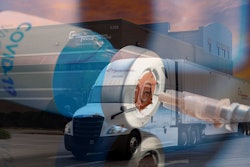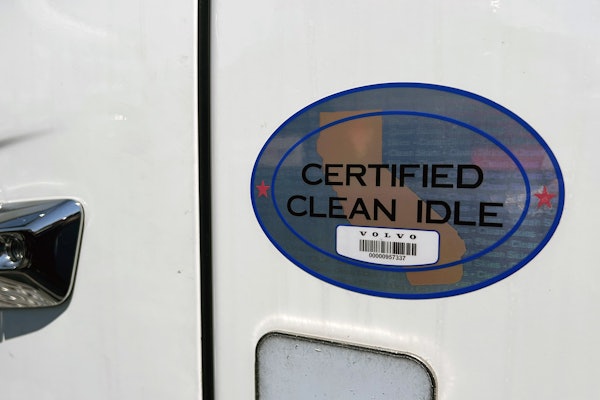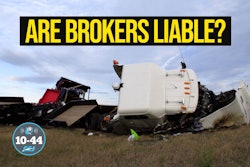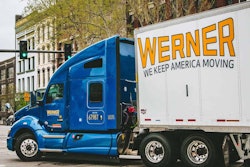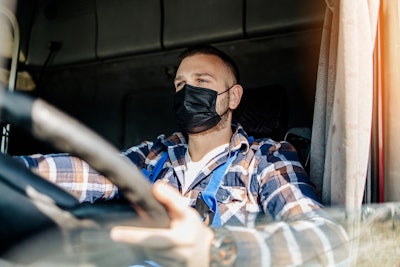
Pfizer's COVID-19 vaccine this week was approved by the Federal Drug Administration (FDA) for people 16 and older – a key hurdle for nearly 30% of adults who have yet to take a single dose. A recent poll by the Kaiser Family Foundation (KFF) found that three in ten unvaccinated adults claimed they would be more likely to get vaccinated if one of the vaccines currently authorized for emergency use were to receive full approval from the FDA.
The Pfizer vaccine first received emergency use authorization in December last year. The more contagious COVID-19 Delta variant is spreading quickly according to the Centers for Disease Control and Prevention and as of last week, the average number of daily cases had reached levels not seen since February. About 70% of all those eligible have received at least one shot, according to the Centers for Disease Control and Prevention, and around 60% are fully vaccinated.
Carriers looking to shield their employees from resurgent COVID-19 cases while striving to step up recruiting efforts during a labor shortage need to exercise caution, experts say, otherwise they risk losing people to ill-advised health policies instead. Businesses can also impose their own vaccine and mask-wearing policies, according to Veriforce Master Trainer James Junkin, so long as they don’t conflict with any laws.
[Related: CDC recommending masks again, trucking volumes should remain strong]
Some companies have already rolled out mandatory vaccination policies for their employees including Walmart, Walt Disney, Google, Facebook and Uber according to The New York Times. Wednesday Delta Air Lines became the first public company to levy a penalty, imposing a $200 monthly surcharge beginning Nov. 1 on unvaccinated employees that are enrolled in Delta’s account-based healthcare plan "to address the financial risk the decision to not vaccinate is creating for our company," Delta CEO Ed Bastian said in a memo to employees. Effective immediately, unvaccinated employees are required to wear masks in all indoor Delta settings.
“The Equal Employment Opportunity Commission (EEOC) has published various pieces upholding the rights of employers to mandate a vaccine under federal law with the exceptions being for those employees who refuse vaccinations because of a disability or a sincerely held religious belief,” Junkin said.
Companies should “contact qualified legal counsel before,” implementing a vaccine mandate, Junkin said.
“While the federal authorities are upholding an employer's right to mandate the vaccine with the exceptions that are noted, various states are moving quickly to enact legislation to prevent employers from mandating vaccinations for COVID-19,” Junkin said. “While the employer may be compliant and legal in its actions on the federal level, an employer could be violating employee rights under state law.”
In addition, some employees may legally challenge an employer’s vaccination policy or quit.
“Employees may decide to resign from their positions and recruitment efforts suffer because of a vaccine mandate,” Junkin added.
According to a recent CCJ survey, carriers are anxious to bring back employees that had been working remotely since the onsite of the pandemic, but but only 2% of respondents said vaccination status would play a role.
'High-risk industry' issue
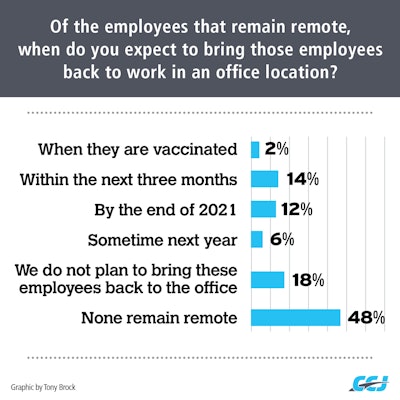 Almost half of all fleets responding to a recent CCJ survey say they no longer have any employees remaining remote, and only 18% plan to allow home-based employees to stay there indefinitely. Collectively, 26% of respondents expect to have all remote employees back in the office by the end of the year, but only 2% said vaccination status would play a role.
Almost half of all fleets responding to a recent CCJ survey say they no longer have any employees remaining remote, and only 18% plan to allow home-based employees to stay there indefinitely. Collectively, 26% of respondents expect to have all remote employees back in the office by the end of the year, but only 2% said vaccination status would play a role.
“Comments around COVID have made up less than 1% of all feedback we have received at WorkHound this year,” said Farrell, whose company provides carriers with app-based, anonymous driver feedback.. “In the feedback we received, the sentiment was mostly negative about everything pandemic related. And the sentiments range across the board. Some drivers are wanting companies to do more to support vaccines and others are wanting the companies to stay out of it.”
Junkin advised that companies carefully assess the level of risk the coronavirus poses before implementing any policies to address it.
“Unless the industry is considered to be a high-risk industry, such as the healthcare industry, it is recommended that employers institute a voluntary vaccination program that is supported by management involvement and a comprehensive educational program in lieu of a mandate,” Junkin said. “Employers seeking to institute a mandated vaccination program are suggested to contact qualified legal counsel before doing so.”
Instead of requiring vaccinations, some companies have been offering incentives to encourage employees to get vaccinated, an approach that Junkin said shouldn’t be taken lightly. According to KFF, about three-quarters of workers whose employers encourage getting a vaccine (73%) – or offer paid time off to do so (75%) – said they have gotten at least one shot – significantly more than the share whose employers don’t openly encourage vaccination (41%) or don’t offer paid time off (51%).
“While companies may choose to incentivize vaccinations, it must be done in a manner that is not discriminatory to workers that are protected by federal or state laws,” Junkin cautioned.
For employees who do not get vaccinated, "a reasonable accommodation might be continued mask wearing, wearing of appropriate respiratory protection such as an N-95, or working from home," Junkin said.
While there are risks in implementing a COVID program, doing nothing, Junkin said, isn’t much of an option.
"In the short term, companies that mandate vaccines and masking programs may experience higher than average employee turnover and longer times to fill vacancies with qualified workers,” Junkin said. “Whether through an employer sponsored volunteer vaccination program or a mandated one, the long-term benefits of a safe and healthy workforce necessitate that employer's promote vaccination. For employers that choose inaction, deadly consequences may await their employees and subsequently their businesses.”
Fleet management likely to face pushback
Vaccine mandates have filtered in for weeks, and within hours of Pfizer's FDA approval Monday President Joe Biden urged private companies to require employees to get vaccinated.
While such a move would no doubt be controversial at the fleet level, it's certain to be unpopular with drivers.
"Not happening," Adam Dille, a driver for Youngstown, Ohio-based bulk hauler R&J Trucking Company, said of his carrier theoretically requiring a COVID-19 vaccine. "I'd have to quit."
Roy Weamer, also a driver at R&J Trucking, said while the carrier didn't require vaccination, the company "highly encourages it."
"It would not matter to me because I got it back in April when I was eligible to receive it," he added, "but the company that we supply made it part of their PPE. Since the vaccination is part of their PPE, they can legally fire anyone who does not get it. They told their workers get it or get another job. They also said if 75% of their employees got it by a certain date, those employees would get a $3,000 bonus. All of the ones that were so defiant and dead set against it are now vaccinated."
"It will never happen," added Anthony Kostelic, an Ohio-based flatbed driver for TMC Transportation said of taking a mandated vaccine.
In a driver market that skews heavily on the demand-side, many drivers said they would walk over being forced to decide between taking a vaccination versus losing their job or face regular testing. Responding to a poll this week by CCJ sister publication Truckers News, 30% of company drivers said they would refuse a mandatory vaccine and force the employer to fire them. Another nearly 17% said they would claim a medical or religious exemption, while 16% said they would quit. Almost 7% said they would comply and get the vaccine. About 25% of drivers polled said they had already been vaccinated.
It's human resources policies and decisions like these that has Byrl Derrick thankful that he's owner and operator of Crossville, Alabama-based Helping Hands Truck'n.
"I work for me," he said, "and neither one of us are getting it."


